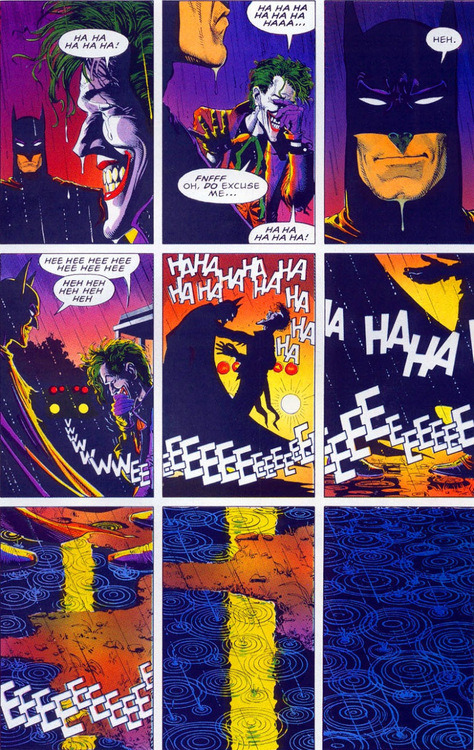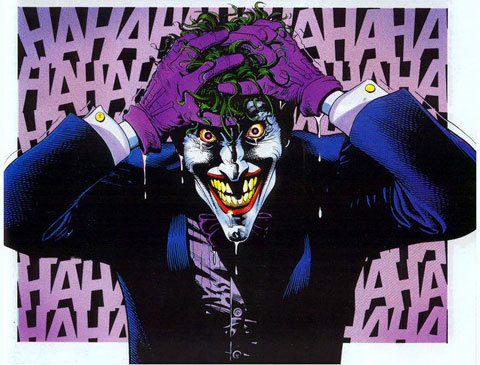In 1998 the comic book world was rocked by the publication of ‘The Killing Joke’. Written by Alan Moore and featuring some striking art by Brian Bolland the effects of this one-shot story still continue to reverberate around the DC Universe.
The story had a massive influence over the origin story of The Joker drawing from the 1951 story ‘The Man Behind the Red Hood’ and rounding out the story in a way which presented The Joker for the first time as a character that the readers could sympathise for.
Tim Burton would go on to say that ‘The Killing Joke’ was the first comic that he loved, citing the fact that he struggled to understand the order in which dialogue should be read until this book came along. “The Killing Joke’ would be a heavy influence on The Joker’s origin in ‘Batman’ (1989), Burton’s first entry in to the Batman movie franchise.
It could be argued that the most profound effect of ‘The Killing Joke’ was on the Gordon family. The shooting of Barbara Gordon robbing her of her life as Batgirl but also revolutionising the Bat-family with the eventual introduction of her new alter-ego Oracle.
This week comic writer Grant Morrison stopped by Kevin Smith’s ‘Fat Man on Batman’ podcast to discuss the end of his run working on ‘Batman Inc.’ which came to a conclusion with issue #13 in July and awaits a final special being published this month.
As the two discussed Batman and comics in general talk turned to ‘The Killing Joke’ with Morrison dropping the following bombshell:
‘No one gets the end, because Batman kills The Joker. That’s why it’s called The Killing Joke. The Joker tells the ‘Killing Joke’ at the end, Batman reaches out and breaks his neck, and that’s why the laughter stops and the light goes out ‘cause that’s the last chance at crossing that bridge. And Alan Moore wrote the ultimate Batman/Joker story… he finished it.’
It’s not the first time that rumours have circulated about Batman having killed The Joker – of course he did kill him during ‘The Dark Knight Returns’ – but this is the first time I can recall somebody so close to the DC inner circle confirming that this is the case in this particular story.
For those who can’t recall the closing panels from memory checkout this reminder:

The artwork is purposefully ambiguous and the fact that The Joker continued to appear in the comics right through to his re-introduction in to the Bat-verse in The New 52 age would say that even if the original intention was for Batman to kill The Joker that was no consequence of the actions in this book that rippled beyond its pages.
The talking point is whether this was the moment that The Joker finally pushed Batman so far that he breaks his no-killing rule. So often the relationship between The Dark Knight and the Clown Prince of Crime has been based on how far that The Joker wants to push Batman and how far he has to escalate his crimes to order to illicit the response he wants.
In all the stories that he has featured in over the years there has never been a contender to the crown of ‘most shocking’ that has ever come close to ‘The Killing Joke’ apart from perhaps ‘Death in the Family’. This year DC tried once more recreate the hype with ‘Death of the Family’ came close to stealing that crown.
To the uninitiated the idea of Batman killing is probably not a shock. To be fair in ‘Batman Returns’ he did attach a bomb to the stomach of one of the circus gang and knock him down a manhole only to leave him to explode. Or if you want to go back even further there was the death of Molly in the pilot of the Adam West TV series.
But to those of us with a love for the character we know that killing is not in his mantra and certainly not something that Bats would do lightly.
Does it ruin the character to have him kill his arch enemy? Or is it the only way to end the story between these two?
I for one think that if Batman were to kill then The Joker would be the one to push him that far. In the context of the events of this book it’s perfectly rational to think that with The Joker striking so close to him that Batman would take such drastic action to end the suffering.
Much in the way that 2008’s ‘The Dark Knight’ shows Batman’s increasing isolated reactions as The Joker increases the scale of his attacks there are examples of Batman’s retaliations across all forms of media.
‘The Killing Joke’ doesn’t necessarily have to impact on parents decisions to expose their children to Batman related products because I wouldn’t put this book in the hands of anybody who I didn’t think could handle the subject matter.
The argument from some more conservative fans will be that Batman has always been accessible to all and can be enjoyed at all ages. It’s a very valid argument as Batman is a hugely profitable brand for DC and Warner Bros. but it’s about identifying your Batman.
I read Batman comics; watch the cartoons and the movies. I see all facets of Batman but I know that ‘my’ Batman is the one in the comics. The darker Batman. The one that hides in the shadows.
The kids that play out in the street with the Batman caps? They’re probably watching Beware the Batman where guns don’t shoot bullets and Batman fights with ninja-like moves.
Is Batman killing The Joker big news? Yes. Is Batman killing The Joker controversial? No.
